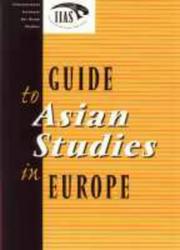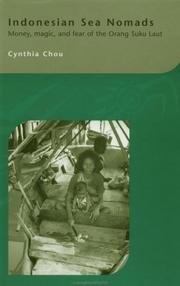| Listing 1 - 10 of 23 | << page >> |
Sort by
|

ISBN: 070071054X 9780700710546 Year: 1998 Publisher: Richmond Curzon
Abstract | Keywords | Export | Availability | Bookmark
 Loading...
Loading...Choose an application
- Reference Manager
- EndNote
- RefWorks (Direct export to RefWorks)
Periodical
ISSN: 09298738 Publisher: Leiden Leiden university
Abstract | Keywords | Export | Availability | Bookmark
 Loading...
Loading...Choose an application
- Reference Manager
- EndNote
- RefWorks (Direct export to RefWorks)
Research. --- International Institute for Asian Studies (Leiden) --- International Institute for Asian Studies --- International Institute for Asian Studies. --- Asia --- Asia. --- Research --- Periodicals --- Arts and Humanities --- Social Sciences --- Society and Culture --- General and Others --- Regional and International Studies
Periodical
Publisher: Leiden : International Institute for Asian Studies,
Abstract | Keywords | Export | Availability | Bookmark
 Loading...
Loading...Choose an application
- Reference Manager
- EndNote
- RefWorks (Direct export to RefWorks)
Periodical
Year: 1993 Publisher: Leiden, Netherlands : International Institute for Asian Studies,
Abstract | Keywords | Export | Availability | Bookmark
 Loading...
Loading...Choose an application
- Reference Manager
- EndNote
- RefWorks (Direct export to RefWorks)
Periodical
Year: 1993 Publisher: Leiden, Netherlands : International Institute for Asian Studies,
Abstract | Keywords | Export | Availability | Bookmark
 Loading...
Loading...Choose an application
- Reference Manager
- EndNote
- RefWorks (Direct export to RefWorks)
International Institute for Asian Studies --- International Institute for Asian Studies. --- Asia --- Asia. --- Research
Periodical
Year: 1993 Publisher: Leiden, Netherlands : International Institute for Asian Studies,
Abstract | Keywords | Export | Availability | Bookmark
 Loading...
Loading...Choose an application
- Reference Manager
- EndNote
- RefWorks (Direct export to RefWorks)
Research. --- International Institute for Asian Studies (Leiden) --- International Institute for Asian Studies --- International Institute for Asian Studies. --- Asia --- Asia --- Asia. --- Research
Book
ISBN: 9048536820 9462985677 9789048536825 9789462985674 Year: 2018 Publisher: Amsterdam University Press
Abstract | Keywords | Export | Availability | Bookmark
 Loading...
Loading...Choose an application
- Reference Manager
- EndNote
- RefWorks (Direct export to RefWorks)
The drums beat, an old man in a grand robe mutters incantations and three brides on horseback led by their grooms on foot proceed to the Naxi Wedding Courtyard, accompanied, watched and photographed the whole way by tourists, who have bought tickets for the privilege. The traditional wedding ceremonies are performed for the ethnic tourism industry in Lijiang, a World Heritage town in southwest China. This book examines how heritage interacts with social-cultural changes and how individuals perform and negotiate their identities through daily practices that include tourism, on the one hand, and the performance of ethnicity on the other. The wedding performances in Lijiang not only serve as a heritage 'product' but show how the heritage and tourism industry helps to shape people's values, dreams and expectations. This book also explores the rise of 'romantic consumerism' in contemporary China. Chinese dissatisfaction with the urban mundane leads to romanticized interests in practices and people deemed to be natural, ethnic, spiritual and aesthetic, and a search for tradition and authenticity. But what, exactly, are tradition and authenticity, and what happens to them when they are turned into performance?
Heritage tourism --- Tradition (Philosophy) --- Heritage tourism. --- Cultural tourism --- Tourism --- Traditionalism (Philosophy) --- Philosophy --- Soziokultureller Wandel --- Tourismus --- Idealisierung --- Brauchtum --- Kulturerbe --- Nationale Minderheit --- China --- China. --- Cina --- Kinë --- Cathay --- Chinese National Government --- Chung-kuo kuo min cheng fu --- Republic of China (1912-1949) --- Kuo min cheng fu (China : 1912-1949) --- Chung-hua min kuo (1912-1949) --- Kina (China) --- National Government (1912-1949) --- China (Republic : 1912-1949) --- People's Republic of China --- Chinese People's Republic --- Chung-hua jen min kung ho kuo --- Central People's Government of Communist China --- Chung yang jen min cheng fu --- Chung-hua chung yang jen min kung ho kuo --- Central Government of the People's Republic of China --- Zhonghua Renmin Gongheguo --- Zhong hua ren min gong he guo --- Kitaĭskai︠a︡ Narodnai︠a︡ Respublika --- Činská lidová republika --- RRT --- Republik Rakjat Tiongkok --- KNR --- Kytaĭsʹka Narodna Respublika --- Jumhūriyat al-Ṣīn al-Shaʻbīyah --- RRC --- Kitaĭ --- Kínai Népköztársaság --- Chūka Jinmin Kyōwakoku --- Erets Sin --- Sin --- Sāthāranarat Prachāchon Čhīn --- P.R. China --- PR China --- Chung-kuo --- Zhongguo --- Zhonghuaminguo (1912-1949) --- Zhong guo --- Chine --- République Populaire de Chine --- República Popular China --- Catay --- VR China --- VRChina --- 中國 --- 中国 --- 中华人民共和国 --- Jhongguó --- Bu̇gu̇de Nayiramdaxu Dundadu Arad Ulus --- Bu̇gu̇de Nayiramdaqu Dumdadu Arad Ulus --- Bu̇gd Naĭramdakh Dundad Ard Uls --- Khi︠a︡tad --- Kitad --- Dumdadu Ulus --- Dumdad Uls --- Думдад Улс --- Kitajska --- China (Republic : 1949- ) --- PRC --- P.R.C. --- BNKhAU --- БНХАУ --- S03/0523 --- S11/0600 --- S11/1223 --- China: Geography, description and travel--Travels: since 1989 --- China: Social sciences--Customs, etiquette --- China: Social sciences--Noso, Naxi --- Cultural heritage. --- ethnic tourism. --- performance. --- romantic consumption.
Book
ISBN: 9048516277 9789048516278 9789089644244 9089644245 Year: 2014 Publisher: Amsterdam
Abstract | Keywords | Export | Availability | Bookmark
 Loading...
Loading...Choose an application
- Reference Manager
- EndNote
- RefWorks (Direct export to RefWorks)
Modernity is surrounded by an almost magic aura that casts a spell over people all over the world. To connect with modernity, various ways and means are used, among them magic practices and religious ideas. Dynamics of Religion in Southeast Asia: Magic and Modernity deals with the magic in and of modernity and asks about its current significance for the dynamics of religion in Southeast Asia. Drawing on recent ethnographic research in this area, the contributors to this wide-ranging volume demonstrate how religious concepts contribute to meeting the challenges of modernity. Against this background, religion and modernity are no longer perceived as in contradiction; rather, it is argued that a revision of the western notion of religion is required to understand the complexity of 'multiple modernities' in a globalised world. Dynamics of Religion in Southeast Asia: Magic and Modernity is part of the series Global Asia, published by Amsterdam University Press (AUP) in close collaboration with the International Institute for Asian Studies (IIAS)
Religion. --- Religion, Primitive --- Atheism --- Irreligion --- Religions --- Theology --- Southeast Asia --- Asia, Southeast --- Asia, Southeastern --- South East Asia --- Southeastern Asia --- RELIGION / General. --- Modernity. --- ethnography. --- magic. --- popular religion. --- south-east Asia.

ISBN: 1135787247 128015053X 020398871X 9780203988718 9780700717248 0700717242 9781135787240 9781135787196 1135787190 9781135787233 1135787239 9781138863484 1138863483 0700717242 Year: 2003 Publisher: London ; New York : RoutledgeCurzon,
Abstract | Keywords | Export | Availability | Bookmark
 Loading...
Loading...Choose an application
- Reference Manager
- EndNote
- RefWorks (Direct export to RefWorks)
The Orang Suku Laut consider themselves indigenous Malays. Yet their interaction with others who call themselves Malays is characterised on both sides by fear of harmful magic and witchcraft. The nomadic Orang Suku Laut believe that the Qur'an contains elements of black magic, while the settled Malays consider the nomads dangerous, dirty and backward. At the centre of this study, based on first-hand anthropological data, is the symbolism of money and the powerful influence it has on social relationships within the Riau archipelago. The first major publication on these maritime nomadic community
Bajau (Southeast Asian people) --- Ethnopsychology --- Money --- Muslims --- Mohammedans --- Moors (People) --- Moslems --- Muhammadans --- Musalmans --- Mussalmans --- Mussulmans --- Mussulmen --- Religious adherents --- Islam --- Currency --- Monetary question --- Money, Primitive --- Specie --- Standard of value --- Exchange --- Finance --- Value --- Banks and banking --- Coinage --- Currency question --- Gold --- Silver --- Silver question --- Wealth --- Cross-cultural psychology --- Ethnic groups --- Ethnic psychology --- Folk-psychology --- Indigenous peoples --- National psychology --- Psychological anthropology --- Psychology, Cross-cultural --- Psychology, Ethnic --- Psychology, National --- Psychology, Racial --- Race psychology --- Psychology --- National characteristics --- Badjao (Southeast Asian people) --- Badjaw (Southeast Asian people) --- Badjo (Southeast Asian people) --- Bajau (Malay people) --- Bajo (Southeast Asian people) --- Lutao (Southeast Asian people) --- Orang Laut (Southeast Asian people) --- Orang Suku Laut (Southeast Asian people) --- Pala-u (Southeast Asian people) --- Sama (Southeast Asian people) --- Sama Dilaut (Southeast Asian people) --- Samal Pala-u (Southeast Asian people) --- Sea Gypsies (Southeast Asian people) --- Ethnology --- Ethnic identity. --- Economic conditions. --- Psychology. --- Social aspects --- Riau (Indonesia : Province) --- Riouw (Indonesia : Province) --- Rhio (Indonesia : Province) --- Riauw (Indonesia : Province) --- Riau, Indonesia (Propinsi) --- Pemda Tingkat I Provinsi Riau (Indonesia) --- Pemerintah Provinsi Riau (Indonesia) --- Provinsi Riau (Indonesia) --- Propinsi Riau (Indonesia) --- Social life and customs. --- Bajau (Peuple d'Asie du Sud-Est) --- Ethnopsychologie --- Musulmans --- Identité ethnique --- Conditions économiques --- Psychologie --- Riau (Indonésie : Province) --- Moeurs et coutumes --- Pemprov Riau (Indonesia) --- Riau Provincial Administration (Indonesia)
Book
ISBN: 9789462984721 9462984727 9048535514 Year: 2020 Publisher: Amsterdam Amsterdam University Press
Abstract | Keywords | Export | Availability | Bookmark
 Loading...
Loading...Choose an application
- Reference Manager
- EndNote
- RefWorks (Direct export to RefWorks)
This collection of essays examines urban communities and societies in Asia and the West to shed much-needed light on issues that have emerged as the world experiences its new urban turn. An urbanized world should be an improving place, one that is better to live in, one where humans can flourish. This book examines contemporary practices of care of the self in cities in Asia and the West, including challenges to citizenship and even the right to the city itself. Written by a range of academics from different backgrounds (from architecture and urbanism, anthropology, social science, psychology, gender studies, history, and philosophy) their trans- and multidisciplinary approaches shed valuable light on what are sometimes quite old problems, leading to fresh perspectives and news ways of dealing with them. One thing that unites all of these papers is their people-centred approach, because, after all, a city is its people.
#SBIB:39A4 --- #SBIB:316.334.5U43 --- #SBIB:316.334.5U20 --- Toegepaste antropologie --- Sociologie van stad en platteland: milieubewegingen --- Sociologie van stad (buurt, wijk, community, stadsvernieuwing) --- Citizenship --- City and town life --- Cities and towns --- Global cities --- Municipalities --- Towns --- Urban areas --- Urban systems --- Human settlements --- Sociology, Urban --- City life --- Town life --- Urban life --- Birthright citizenship --- Citizenship (International law) --- National citizenship --- Nationality (Citizenship) --- Political science --- Public law --- Allegiance --- Civics --- Domicile --- Political rights --- Law and legislation --- Philosophy, Cities, Citizenship, Care, Becoming.
| Listing 1 - 10 of 23 | << page >> |
Sort by
|

 Search
Search Feedback
Feedback About UniCat
About UniCat  Help
Help News
News